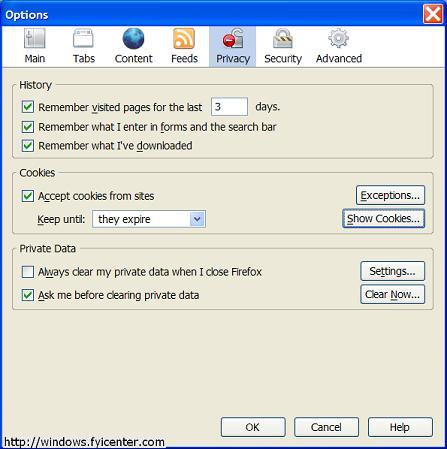Cache
![]()
![]() What Files Are Stored in the Cache?
What Files Are Stored in the Cache?![]()
![]()
All types of files related to the websites you visit are stores in the cache. These include image files like JPEG or GIF files. The actual web page HTML file can also be downloaded and stored on your computer.![]()
![]() Why Should I need to Clear the Cache?
Why Should I need to Clear the Cache? ![]()
![]()
There are a couple of issues you need to be aware of. Firstly, the cache takes up space on your hard disk which could impact your computer's performance. Also you may find that it is necessary to re-load a web page to get the most up to date version. However, the biggest issue relates to your privacy.
Your web browser's cache leave a virtual "paper trial" of the websites you visit. A person with access to your web browser's cache could easily figure out which website you visit and see examples of the content which could potentially be very embarrassing!![]()
![]() How to Clear the Cache?
How to Clear the Cache? ![]()
![]()
Here are the instruction for the 2 most popular web browsers - FireFox and Internet Explorer.![]()
![]() Internet Explorer -
Internet Explorer -![]()
![]() from the main menu bar select Tools>Internet Options. Select "temporary internet files" or "browsing history" (in Internet Explorer 7) and hit the "Delete" button.
from the main menu bar select Tools>Internet Options. Select "temporary internet files" or "browsing history" (in Internet Explorer 7) and hit the "Delete" button.
![]()
![]() FireFox -
FireFox -![]()
![]() from the main menu bar select Tools>Internet Options>Privacy. The go the "Private Data" section, select "settings" and make sure "cache" is selected. You can then click the "Clear Now" button to clean the cache. In newer version there is a short cut key so you can clear your cache without having to navigate through the menu options.
from the main menu bar select Tools>Internet Options>Privacy. The go the "Private Data" section, select "settings" and make sure "cache" is selected. You can then click the "Clear Now" button to clean the cache. In newer version there is a short cut key so you can clear your cache without having to navigate through the menu options.
Is there an Easier Way to Clear the Cache? ![]()
![]()
The cache is not the only set of files that your computer collects which can cause serious privacy issues. Your browser for example stores a history of the URLs you visit. The Windows operating system also stores a list of files you recently accessed including media files like videos which you download.
Thankfully there are a number of good software products which help you clear out all of these files. This a critical part of protecting your privacy and helps boost your computer's performance.
Try a free scan and see what potential privacy risks are lurking on your computer





















